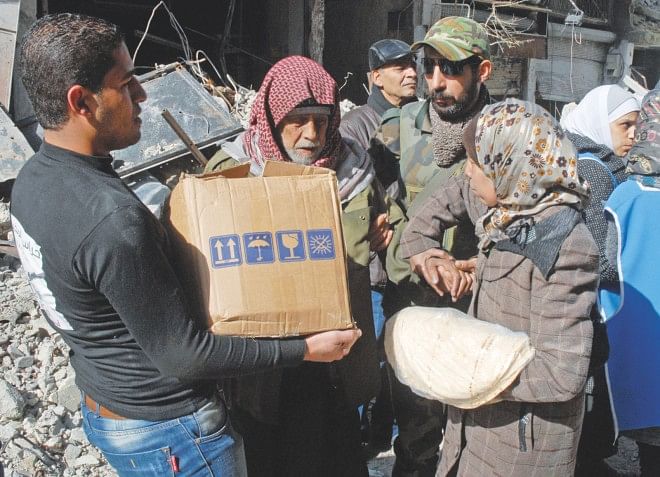Syria to miss chem arms deadline
Syria to miss chem arms deadline
HRW accuses regime of razing homes as 'collective punishment'

Syria has given up less than 5 percent of its chemical weapons arsenal and will miss next week's deadline to send all toxic agents abroad for destruction, sources familiar with the matter said as the ice is slowly breaking in peace talks between Syria's warring sides in geneva.
The deliveries, in two shipments this month to the northern Syrian port of Latakia, totalled 4.1 percent of the roughly 1,300 tonnes of toxic agents reported by Damascus to the Organisation for the Prohibition of Chemical Weapons (OPCW), said the sources, who spoke on condition of anonymity.
"It's not enough and there is no sign of more," one source briefed on the situation said.
The internationally backed operation, overseen by a joint OPCW-United Nations mission, is now 6-8 weeks behind schedule. Damascus needs to show it is still serious about relinquishing its chemical weapons, the sources told Reuters.
Failure to eliminate its chemical weapons could expose Syria to sanctions, although these would have to be supported in the UN Security Council by Russia and China, which have so far refused to back such measures against President Bashar al-Assad.
The deal under which Syria undertook to eliminate its chemical arsenal stopped the United States and its allies from launching bombing raids to punish Assad for a chemical attack last August and made clear the limits to international action against him.
Syria has blamed delays on security obstacles. It said the mission could not be safely carried out unless it received armoured vehicles and communications equipment.
Meanwhile, Human Rights Watch yesterday accused Syria's government of razing thousands of homes as "collective punishment" of communities that back the opposition in the capital Damascus and in Hama province.
The group in a report accused Syria's government of "wiping entire neighbourhoods off the map" using bulldozers and explosives.
"These unlawful demolitions are the latest additions to a long list of crimes committed by the Syrian government," said HRW's emergencies researcher Ole Solvang.
The New York-based group said it had documented seven cases of mass demolitions between July 2012 and July 2013 -- two in central Hama province and five in and around Damascus.
Using satellite imagery, the group said it estimated a total area of at least 140 hectares -- around 200 football fields -- had been razed.
More than 130,000 people have been killed since Syria's conflict began in March 2011. Millions have been displaced inside the country or fled across its border becoming refugees.
In Geneva, UN mediator Lakhdar Brahimi on Wednesday warned that no substantive results were expected during this round of talks despite improving ties between the warring parties.
"The ice is breaking, slowly, but it is breaking," Brahimi told reporters after a fifth day of talks in Geneva, which both sides described as "positive."
He acknowledged he did not expect "anything substantive" to come out of the initial round, which is set to conclude today.
But he stressed that simply getting the parties talking for the first time since the conflict erupted in March 2011 was an important step forward.